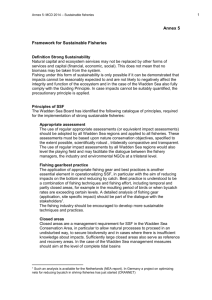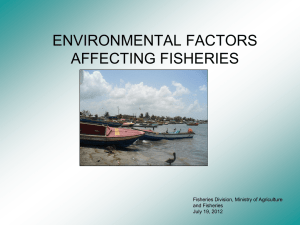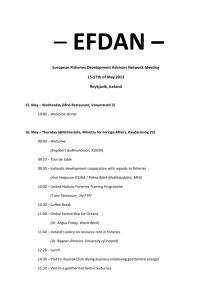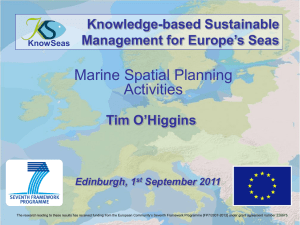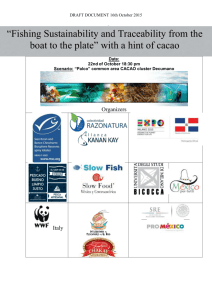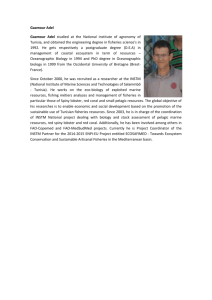IUCN SULi/FEG input - Food and Agriculture Organization of the
advertisement
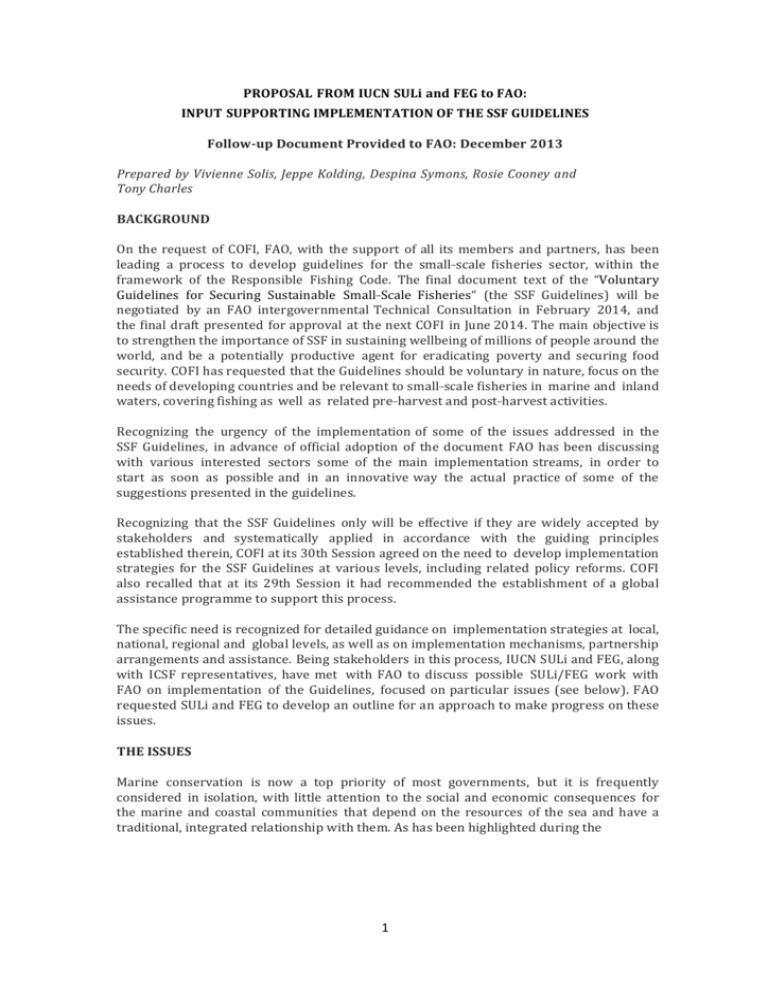
PROPOSAL FROM IUCN SULi and FEG to FAO: INPUT SUPPORTING IMPLEMENTATION OF THE SSF GUIDELINES Follow-up Document Provided to FAO: December 2013 Prepared by Vivienne Solis, Jeppe Kolding, Despina Symons, Rosie Cooney and Tony Charles BACKGROUND On the request of COFI, FAO, with the support of all its members and partners, has been leading a process to develop guidelines for the small--‐scale fisheries sector, within the framework of the Responsible Fishing Code. The final document text of the “Voluntary Guidelines for Securing Sustainable Small--‐Scale Fisheries“ (the SSF Guidelines) will be negotiated by an FAO intergovernmental Technical Consultation in February 2014, and the final draft presented for approval at the next COFI in June 2014. The main objective is to strengthen the importance of SSF in sustaining wellbeing of millions of people around the world, and be a potentially productive agent for eradicating poverty and securing food security. COFI has requested that the Guidelines should be voluntary in nature, focus on the needs of developing countries and be relevant to small--‐scale fisheries in marine and inland waters, covering fishing as well as related pre--‐harvest and post--‐harvest activities. Recognizing the urgency of the implementation of some of the issues addressed in the SSF Guidelines, in advance of official adoption of the document FAO has been discussing with various interested sectors some of the main implementation streams, in order to start as soon as possible and in an innovative way the actual practice of some of the suggestions presented in the guidelines. Recognizing that the SSF Guidelines only will be effective if they are widely accepted by stakeholders and systematically applied in accordance with the guiding principles established therein, COFI at its 30th Session agreed on the need to develop implementation strategies for the SSF Guidelines at various levels, including related policy reforms. COFI also recalled that at its 29th Session it had recommended the establishment of a global assistance programme to support this process. The specific need is recognized for detailed guidance on implementation strategies at local, national, regional and global levels, as well as on implementation mechanisms, partnership arrangements and assistance. Being stakeholders in this process, IUCN SULi and FEG, along with ICSF representatives, have met with FAO to discuss possible SULi/FEG work with FAO on implementation of the Guidelines, focused on particular issues (see below). FAO requested SULi and FEG to develop an outline for an approach to make progress on these issues. THE ISSUES Marine conservation is now a top priority of most governments, but it is frequently considered in isolation, with little attention to the social and economic consequences for the marine and coastal communities that depend on the resources of the sea and have a traditional, integrated relationship with them. As has been highlighted during the 1 negotiation of the SSF Guidelines, these considerations are of extreme importance in achieving sustainable use and conservation of the marine resources and ecosystem services that sustain the wellbeing and livelihood of thousands of communities. Insufficient attention has been paid to the importance of SSF in relation to ecosystem management, food sovereignty, sustainable use, gender, and indigenous and local knowledge (among other issues), reducing the possibility of reaching either conservation or socio--‐economic goals. One of the central issues in fisheries management and governance is to combine, reconcile and integrate utilisation and conservation — this is where we think SULi and FEG, as specialist groups under IUCN, have an important and unique contribution to make. SULi and FEG have proposed they work with FAO on three specific focal issues in SSF: 1. The integration of scientific and traditional knowledge in the assessment and management of small scale fisheries. The need for this integration is well recognized in the draft SSF Guidelines, but currently there is virtually no guidance or technical resources available to assist fisheries managers and policymakers in achieving this. 2. The sustainable use of marine resources in the small scale fisheries sector. Here again the need for sustainable use is recognised in the draft SSF Guidelines, but there is a critical need for synthesis of experience and knowledge in how to achieve this in practice, in order to promote a responsible balance between conservation and livelihoods. 3. The effective and equitable governance of small-scale fisheries, essential to the successful implementation of the SSF Guidelines. This will build on aspects of the recent tenure guidelines and good governance initiatives of FAO, as well as the range of expertise available within SULi and FEG on these themes. These subjects appear to be common fields of consideration for all stakeholders, especially in the framework of relevant agreements already approved by governments around the world such as the Convention on Biological Diversity, Río +20, and other agreements related to marine conservation, sustainable use and livelihoods. THE GUIDELINES AND THE FOCAL ISSUES: Sustainable Use, Knowledge and Governance considerations in the SSF Guidelines The draft Guidelines (using here the Chair's Text from the May Technical Consultation) recognize in their Preface the importance of sustainable use in the future attention of SSF (all italics added): Paragraph 3: “Small--‐scale and artisanal fisheries, encompassing all activities along the value chain – pre--‐harvest, harvest and post--‐harvest – undertaken by men and women, play an important role in food security and nutrition, poverty eradication, equitable development and sustainable resource utilization. Small--‐scale fisheries provide nutritious food for local, national and international markets, generate income to support local and national economies." Paragraph 6: "Despite their importance, many small--‐scale fishing communities continue to be marginalized and their contribution to food security and nutrition, poverty eradication, equitable development and sustainable resource utilization – which benefits both them and others – is not fully realized." Sustainable use, the importance of knowledge building and traditional/local knowledge, and fisheries governance are all fundamental to the SSF Guidelines' Objectives, which include: c) *to achieve the sustainable utilization, prudent and responsible management and conservation of fisheries resources consistent with the CCRF and related instruments* d) *to promote the contribution of small--‐scale fisheries to an economically, socially 2 and environmentally sustainable future for our planet and its people* e) to [provide guidance] [propose principles and criteria] that could be considered by States and stakeholders for the development and implementation of ecosystem friendly and participatory policies, strategies and legal frameworks for the enhancement of responsible and sustainable small--‐scale fisheries [management] [governance] and development. f) *to enhance the public awareness and promote the advancement of knowledge on the culture, role, contribution and potential of small--‐scale fisheries, considering ancestral and traditional knowledge, and their related constraints and opportunities.* Likewise, most of the Guiding Principles relate to sustainable use and fisheries governance, but two of them are of particular importance for the global discussion: 9. *Economic, social and environmental sustainability: applying the precautionary approach and risk management to guard against undesirable outcomes, including overexploitation of fishery resources and negative environmental, social and economic impacts.* 10.*Holistic and integrated approaches: recognizing the ecosystem approach to fisheries (EAF) as an important guiding principle, embracing the notions of comprehensiveness and sustainability of all parts of ecosystems as well as the livelihoods of small--‐scale fishing communities, and ensuring cross--‐sectoral coordination since small--‐scale fisheries are closely linked to and dependent on many other sectors.* The Guidelines refer explicitly to the CCRF and support sustainable resource utilization in accordance with this instrument. Further, throughout sections on Governance of Tenure and Resource Management; Social Development, Employment and Decent Work; Value Chains, Post--‐Harvest and Trade; and Capacity Development, issues and concerns related to sustainable use of resources, to recognition of local/traditional knowledge and its integration with scientific knowledge, and to fisheries governance are repeatedly highlighted. However, there is very little guidance in the Guidelines as to how these issues can be addressed in the implementation process, and it is here where we seek to contribute. HOW SULI AND FEG CAN CONTRIBUTE ON THESE ISSUES The IUCN Sustainable Use and Livelihoods Specialist Group (SULi) is jointly constituted under IUCN’s Species Survival Commission (SSC) and its Commission on Environmental, Economic and Social Policy (CEESP). It thus unites biological/ecological expertise related to human use of living natural resources with expertise on the socio--‐economic dimensions of use. Its mission is to promote effective and equitable conservation through the sustainable use of wild resources. It is a global network of over 250 specialists across many dimensions of use, from monitoring to indigenous knowledge to international policy, and unites researchers, practitioners, and those involved in policy-‐‐ and decision--‐ making at a number of levels. CEESP and SSC launched SULi in late 2011 to build on the work of the former Sustainable Use Specialist Group (SUSG), with a new emphasis on the linkage of use to indigenous and local community livelihoods. One of the most notable achievements of the SUSG was the development of the IUCN Policy Statement on Sustainable Use of Wild Living Resources. 3 This statement represents the broad consensus of the IUCN community, and, among other things, recognizes that “both consumptive and non-‐‐ consumptive use of biological diversity are fundamental to the economies, cultures, and well--‐being of all nations and peoples”; that “use, if sustainable, can serve human needs on an ongoing basis while contributing to the conservation of biological diversity”; and that “use of wild living resources, if sustainable, is an important conservation tool because the social and economic benefits derived from such use provide incentives for people to conserve them”. The broad aim of SULi is to help relevant stakeholders throughout the world put this policy into practice. Small--‐scale fisheries is one of its five current focal areas of work. The IUCN Fisheries Expert Group (FEG) was established at the 2008 IUCN World Congress in Barcelona under the Commission of Ecosystem Management (CEM). FEG consists of a limited number of senior fisheries experts from around the world with substantial knowledge of the operational, socio--‐economic and ecosystem approach issues affecting fisheries. Its mission is to foster the sustainable development of fisheries and to promote the conservation of the related marine ecosystems, to inform fisheries policy and related conservation strategies, to propose management methods and tools and to seek to provide a link between the fishery and biodiversity expert communities of IUCN. Despite its relatively short existence, FEG has already established itself as an important think--‐tank and provider of practical ideas and solutions to the implementation of EAF, such as for example the Balanced Harvest concept, which aims to sustain high yielding fisheries without causing deep disturbances to the exploited ecosystem. This concept was partly developed from studying small--‐scale fisheries, and may be particularly relevant for the SSF Guidelines. As stated above, in SULi and FEG we have discussed three issues in particular that are central to our Missions and to the Guidelines: sustainable use, integration of scientific and traditional knowledge, and effective governance. In relation to these issues, we believe that two key directions of work would potentially be valuable to assist future implementation: 1. Developing technical summaries / analyses of available information on each of the three issues of sustainable use, integration of scientific and traditional knowledge, and effective governance, including identification of knowledge gaps and research priorities; 2. Developing an analysis of best practices and ‘lessons learned’ with respect to sustainable use, integration of scientific and traditional knowledge, and effective governance, based on a combination of a global synthesis of existing knowledge, and a set of targeted case studies illustrating specific issues, challenges, opportunities or approaches. This may include, for example, case studies that address how the three key implementation issues can be dealt with (1) in multi-species, multi-gear SSF, through fishing strategies which can be looked upon from different angles than the conventional selective harvest patterns that characterize fisheries theory, (2) in SSF providing practical local examples of the integration of local and scientific knowledge in management and monitoring, and (3) in SSF that involve interactions of sustainable use and human rights. Drawing on these activities will provide guidance to support Guidelines implementation. We propose that work on these major activities lead into, and continue subsequent to, a major workshop on guidelines implementation, described below. 4 OBJECTIVES AND THEMES FOR A WORKSHOP ON GUIDELINES IMPLEMENTATION General objective Support FAO, members and partners on implementation actions within the framework of the SSF Guidelines. Specific objectives At the planned workshop, SULi and FEG would assemble experts, including its members, to present and discuss small--‐scale fisheries approaches, particularly in relation to the three focal areas of sustainable use, integration of scientific and traditional knowledge, and effective governance. This would include, for example, discussion of the potential of SSF for (self)--‐governance, their vulnerability, and their fragile relationship with conventional management tools and calls for management reforms. The workshop would also highlight knowledge needs concerning SSF, which both SULi and FEG think we need to address. The main theme of the workshop would be the importance of the focal issues, issues and challenges arising in practice on the implementation of the Guidelines, including broad implications for governance and management. We envisage this as including case studies of good practice in the focal areas, drawn from our or partners networks. Provided resources are available or can be found for travel and DSA, we could provide at least four major presentations, on topics such as integration of local and scientific knowledge and its implications for sustainable use; and relations between conservation and fisheries in SSFs, including role and impact of MPAs on SSFs and of large scale environmental NGOs, particularly in Small Island Developing States (SIDS). These presentations could be explicitly framed to contribute to the debate on the guidelines implementation. We suggest the following key organisations be involved in work on these and related issues: ICCA Consortium (Indigenous peoples and Community Conserved territories and Areas Consortium) LMMA network (Locally Managed Marine Areas network) ICSF (International Collective in Support of Fishworkers) WFF (World Forum of Fish Harvesters and Fish Workers) Sub--‐regional Fishery Commission (Dakar). 5


